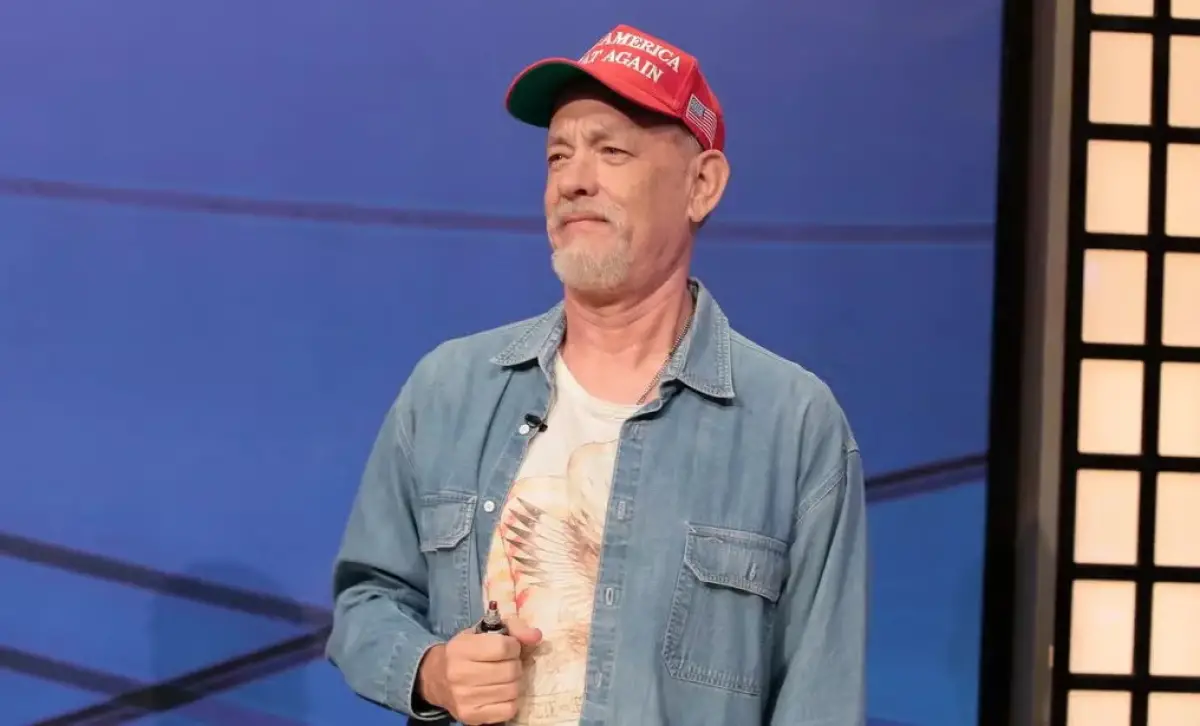In a performance that has ignited a firestorm of controversy, actor Tom Hanks has come under heavy fire for his portrayal of a “typical white male Trump voter” during Saturday Night Live’s 50th anniversary special. Hanks, widely known for his iconic roles in films such as Forrest Gump, reprised his character Doug—a clueless figure donning a Make America Great Again hat and an American Eagle shirt—in a skit that many viewers found deeply offensive.
During one segment of the “Black Jeopardy” skit, Hanks was seen hesitating to shake hands with Kenan Thompson’s character, Darnell Hayes, who is Black. This moment, intended to be humorous, was interpreted by many as an attempt to stereotype and mock Trump supporters. Critics quickly pounced on the scene, labeling it as a tired and unfunny political jab aimed at discrediting conservative voters.
Social media erupted in response. One former aide to Robert F. Kennedy Jr., Link Lauren, posted on X (formerly Twitter), “This show wonders why their ratings are in the gutter. Trump won the popular vote. This tired trope that MAGA is racist is disgusting. SNL is an unfunny show for snobbish liberal elites.” Others expressed similar sentiments. “SNL’s desperate attempt to smear Trump supporters as racist is tired and pathetic,” one user wrote, while another lamented, “I used to have so much respect for Tom Hanks as an actor. Now, I can’t bear to watch any of his movies—even from the 80s.” A particularly scathing comment read, “Tom Hanks just came out on SNL as a racist Trump supporter that refuses to shake hands with a black man. This is why SNL is in the toilet.”
The backlash has not been limited to social media alone. Many viewers across the country have criticized the network for what they see as a deliberate politicization of entertainment. Critics argue that Hanks, a beloved actor with decades of experience, should steer clear of overt political commentary and instead focus on his craft. “You established yourself as an entertainer, so why not just entertain?” one detractor wrote. Others suggest that Hanks’ portrayal is a reflection of a broader cultural divide where left-leaning elites continue to belittle the values of Trump supporters.
Despite the outcry, some defend Hanks’ performance as part of SNL’s long history of provocative political satire. Supporters of the skit claim that it is a necessary form of commentary in today’s highly polarized political environment. They argue that by taking a jab at Trump voters, Hanks is simply engaging in the tradition of SNL, which has often lampooned public figures and contentious political issues. “It’s just another day on SNL,” one pro-satire commentator remarked. “We expect a bit of irreverence and bold humor in these specials.”
The controversy comes at a time when political tensions in the United States are running high. With President Trump’s enduring popularity among a significant portion of the electorate and ongoing debates about voter rights and political representation, every public comment and performance is scrutinized under a polarized lens. The incident has once again highlighted the chasm between the left and right, as what one side views as clever satire, the other perceives as an unacceptable attack on their values.
The skit, which was part of SNL’s 50th anniversary celebration, aimed to blend humor with political commentary, yet it appears that the choice of material struck a nerve with many viewers. Critics argue that by portraying Trump supporters as racist and clueless, Hanks not only offends a large segment of the population but also oversimplifies complex political realities. “It’s a lazy stereotype that does nothing but further entrench divisions,” commented one political analyst.
As the debate rages online, some industry insiders question whether such controversies will affect Hanks’ illustrious career. While his long list of accolades and beloved film roles have cemented his legacy, this incident could mark a turning point in how political satire is received by a more divided public. “The entertainment landscape is changing,” noted a Hollywood insider. “What was once seen as harmless fun is now viewed as a political statement, and that carries risks.”
For now, SNL continues to push boundaries, and Hanks’ performance stands as a stark reminder of the risks inherent in political satire. The incident underscores the challenges faced by artists and entertainers in a hyper-partisan era, where even a well-intentioned joke can provoke widespread outrage.
In conclusion, while some defend Hanks’ role on SNL as an exercise in free speech and political commentary, others see it as a misguided attempt to score political points at the expense of unity. Whether this controversy will have lasting implications for Hanks’ career or for SNL’s approach to political satire remains to be seen, but one thing is clear: in today’s charged political climate, no performance goes unnoticed.

